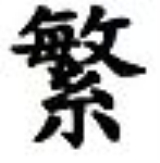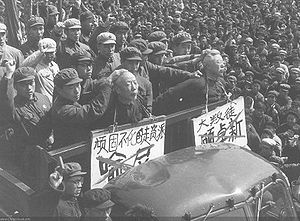
Struggle Session
Encyclopedia
A struggle session was a form of public humiliation used by the Communist Party of China
to enforce a reign of terror in the Mao Zedong
era to shape public opinion and to humiliate, persecute, and/or execute political rivals, so-called class enemies. In general, the victim of a struggle session was forced to admit to various crimes before a crowd of people who would verbally and physically abuse the victim until he or she confessed.
During Mao's rule, the Chinese people were forced to attend many different types of struggle sessions, sometimes consisting of 100,000 people. During the 1950s when the CCP began the Land Reform movement, poorer peasants seized the land from their landlords, who were given the title of exploiting class (剥削階级), and an estimated 2 million landlords were swiftly executed after being subjected to a struggle session.
 Struggle sessions developed from similar ideas of criticism and self-criticism
Struggle sessions developed from similar ideas of criticism and self-criticism
in the Soviet Union
from the 1920s. The term refers to class struggle
; ostensibly, the session is held to benefit the target, by eliminating all traces of counterrevolutionary, reactionary thinking. Chinese Communists resisted this at first, because struggle sessions conflicted with the Chinese concept of saving face
, but struggle sessions became commonplace at Communist Party
meetings during the 1930s due to public popularity.
, Counter revolutionary, and running dog
of the imperialist petty bourgeoisie were a part of the public discourse of revolution, acts of vigilante justice enacted by citizens and, for at least the first few years, never the army. Millions of ordinary Chinese were executed under these accusations. Mao Zedong then turned these weapons on his own comrades as leaders began to regret the loss of law and order that seemed to be destroying their previous way of life.
Famous revolutionaries like Liu Shaoqi
, Deng Xiaoping
, Zhu De
, Peng Dehuai
and many more, had been subjected to repeated struggle sessions, and many of them died in prison. However, individuals like Panchen Lama after long years of public questioning, absent of torture, and imprisonment, later rejoin the Communist Party.
took power.
Deng Xiaoping prohibited struggle sessions and other kinds of Mao-era violent political campaigns.
Communist Party of China
The Communist Party of China , also known as the Chinese Communist Party , is the founding and ruling political party of the People's Republic of China...
to enforce a reign of terror in the Mao Zedong
Mao Zedong
Mao Zedong, also transliterated as Mao Tse-tung , and commonly referred to as Chairman Mao , was a Chinese Communist revolutionary, guerrilla warfare strategist, Marxist political philosopher, and leader of the Chinese Revolution...
era to shape public opinion and to humiliate, persecute, and/or execute political rivals, so-called class enemies. In general, the victim of a struggle session was forced to admit to various crimes before a crowd of people who would verbally and physically abuse the victim until he or she confessed.
During Mao's rule, the Chinese people were forced to attend many different types of struggle sessions, sometimes consisting of 100,000 people. During the 1950s when the CCP began the Land Reform movement, poorer peasants seized the land from their landlords, who were given the title of exploiting class (剥削階级), and an estimated 2 million landlords were swiftly executed after being subjected to a struggle session.
Etymology
According to Lin Yu-tang, the expression comes from 批判 [pi1pan4], meaning "to judge", and 鬥爭, meaning "to fight"; so the whole expression conveys the message of inciting the spirit of judgment and fighting. Instead of saying the full phrase 批判鬥爭:pi pan dou zhen, it was shortened to 批鬥:pi dou.Origins and purpose

Self-criticism
Self-criticism refers to the pointing out of things critical/important to one's own beliefs, thoughts, actions, behaviour or results; it can form part of private, personal reflection or a group discussion.-Philosophy:...
in the Soviet Union
Soviet Union
The Soviet Union , officially the Union of Soviet Socialist Republics , was a constitutionally socialist state that existed in Eurasia between 1922 and 1991....
from the 1920s. The term refers to class struggle
Class struggle
Class struggle is the active expression of a class conflict looked at from any kind of socialist perspective. Karl Marx and Friedrich Engels wrote "The [written] history of all hitherto existing society is the history of class struggle"....
; ostensibly, the session is held to benefit the target, by eliminating all traces of counterrevolutionary, reactionary thinking. Chinese Communists resisted this at first, because struggle sessions conflicted with the Chinese concept of saving face
Face (sociological concept)
Face, idiomatically meaning dignity/prestige, is a fundamental concept in the fields of sociology, sociolinguistics, semantics, politeness theory, psychology, political science, communication, and Face Negotiation Theory.-Definitions:...
, but struggle sessions became commonplace at Communist Party
Communist Party of China
The Communist Party of China , also known as the Chinese Communist Party , is the founding and ruling political party of the People's Republic of China...
meetings during the 1930s due to public popularity.
Accounts of struggle sessions
Lately, the term "struggle session" has come to be applied to any scene where victims are publicly badgered to confess imaginary crimes under the pretext of self-criticism and rehabilitation.Victims of struggle sessions
Ever since the Communist notion of class enemies (階级敌人) was introduced into China, terminologies such as Capitalist roaderCapitalist roader
In Maoist thought, a capitalist roader or is a person or group who demonstrates a marked tendency to bow to pressure from Bourgeois forces and subsequently attempts to pull the Revolution in a capitalist direction....
, Counter revolutionary, and running dog
Running dog
Running dog is a literal translation into English of the Chinese/Korean communist pejorative zǒu gǒu 走狗, meaning lackey or lapdog, an unprincipled person who helps or flatters other, more powerful and often evil people...
of the imperialist petty bourgeoisie were a part of the public discourse of revolution, acts of vigilante justice enacted by citizens and, for at least the first few years, never the army. Millions of ordinary Chinese were executed under these accusations. Mao Zedong then turned these weapons on his own comrades as leaders began to regret the loss of law and order that seemed to be destroying their previous way of life.
Famous revolutionaries like Liu Shaoqi
Liu Shaoqi
Liu Shaoqi was a Chinese revolutionary, statesman, and theorist. He was Chairman of the People's Republic of China, China's head of state, from 27 April 1959 to 31 October 1968, during which he implemented policies of economic reconstruction in China...
, Deng Xiaoping
Deng Xiaoping
Deng Xiaoping was a Chinese politician, statesman, and diplomat. As leader of the Communist Party of China, Deng was a reformer who led China towards a market economy...
, Zhu De
Zhu De
Zhu De was a Chinese militarist, politician, revolutionary, and one of the pioneers of the Chinese Communist Party. After the founding of the People's Republic of China, in 1955 Zhu became one of the Ten Marshals of the People's Liberation Army, of which he is regarded as the founder.-Early...
, Peng Dehuai
Peng Dehuai
Peng Dehuai was a prominent military leader of the Communist Party of China, and China's Defence Minister from 1954 to 1959. Peng was an important commander during the Second Sino-Japanese War, the Chinese civil war and was also the commander-in-chief of People's Volunteer Army in the Korean War...
and many more, had been subjected to repeated struggle sessions, and many of them died in prison. However, individuals like Panchen Lama after long years of public questioning, absent of torture, and imprisonment, later rejoin the Communist Party.
Disuse after 1978
Struggle sessions were disowned in China after 1978, when the reformers led by Deng XiaopingDeng Xiaoping
Deng Xiaoping was a Chinese politician, statesman, and diplomat. As leader of the Communist Party of China, Deng was a reformer who led China towards a market economy...
took power.
Deng Xiaoping prohibited struggle sessions and other kinds of Mao-era violent political campaigns.
See also
- Zhen FanZhen FanThe Campaign to Suppress Counterrevolutionaries was the first political campaign launched by the People's Republic of China designed to eradicate opposition elements, especially former Kuomintang functionaries accused of trying undermine the new Communist government...
- Futian incidentFutian incidentThe Futian incident is the common title for the December 1930 purge of a battalion of the Jiangxi-Fujian Soviet's "Red Army" at Futian...
- Anti-Bolshevik League incidentAnti-Bolshevik League incidentThe Anti-Bolshevik League incident, or AB League Incident , was a period of political purge in the territory of a Chinese Communist revolutionary bases in Jiangxi province. Mao Zedong accused his political rivals of belonging to the Kuomintang intelligence agency "Anti-Bolshevik League"...
- Red terrorRed TerrorThe Red Terror in Soviet Russia was the campaign of mass arrests and executions conducted by the Bolshevik government. In Soviet historiography, the Red Terror is described as having been officially announced on September 2, 1918 by Yakov Sverdlov and ended about October 1918...
- Two Minutes HateTwo Minutes HateIn George Orwell's novel Nineteen Eighty-Four, the Two Minutes Hate is a daily period in which Party members of the society of Oceania must watch a film depicting the Party's enemies and express their hatred for them.-Details in Nineteen Eighty-Four:The film and its accompanying auditory and...

